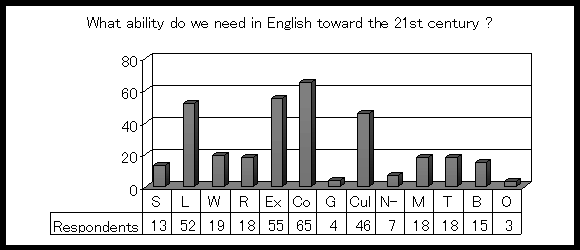
Chapter 3 English Needs Analysis
3-1 The web research on English competence
I have analyzed ‘English Needs’ for Japanese learners on the ‘Web’( World Wide Web; Internet ). Table 3-1-1 and Chart 3-1-1 shows the result of 100 respondents
Research Period; From July, 1996 to December, 1996 (For 6 months)
I researched these 13 categories below.
<Categories>
|
N.B. I uploaded three types of answering sheet-forms; Japanese version( through ‘CGI’),
English version( through ‘CGI’), and English mailing form.
‘CGI’ is the abbreviation for ‘Common Gate Interface’ on the web.
Table 3-1-1
| Speaking | Listening |
Writing |
Reading |
Expression |
Communication |
Grammar |
13 |
52 |
19 |
18 |
55 |
65 |
4 |
Culture |
Non verbal |
Manners |
Thinking |
Basic ability |
Others |
|
46 |
7 |
18 |
18 |
15 |
3 |
N = 100
X2 ( 12 ) = 208.511, p<.01
N.B. (Breakdown of 100 respondents)
Teachers(the persons concerned with teaching; professors, the cramming school instructors…etc.) = 30 / Businessmen(the persons concerned with using English; office workers, doctors, independent businessmen…etc.) = 32 / Students(the persons concerned with learning; housewives, persons without occupation…etc)=29 / Natives = 9.
Chart 3-1-1

We can easily recognize four prominent findings; ‘L’(Listening), ‘Ex’(Expression), ‘Co’(Communication) and ‘Cul’(Culture). Among four skills the supporting number of ‘Listening’ is the most prominent. This finding matches Dr.Uemura’s opinion(See Chapter 2-2).
Next chart 3-1-2 shows another analysis using the same data as table 3-1-1.
The chart 3-1-2 have three labels by ‘Generation’; 20’s, 30’s and 40’s-60’s.
Please notice the 20’s has many students, the 30’s has many teachers, the 40’s-60’s has many professors, housewives.
Chart 3-1-2
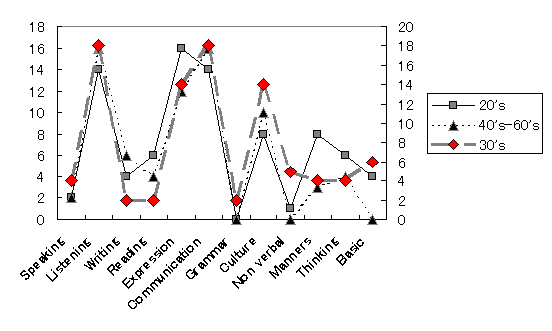
This is the minority opinion, but the 20’s is more aware of ‘manners / attitude’. And the 20’s and 30’s are more aware of ‘basic English academic ability’. But both of them are not aware of ‘Grammar’. Remember most of the 20’s and 30’s are students and teachers. They know the evaluating view point of ‘the positive attitude for communication’ at school. And they also know about the importance of the ‘basic English academic ability’, but they tend to avoid using the word of ‘grammar’.
Except grammar what is the basic ability?
Next table 3-1-2 shows the findings classified by ‘occupation’.
Simultaneously I checked up the correlation between them. Table 3-1-3 shows the ‘correlation coefficient’. Especially I was very interested in the correlation between ‘Natives’ and others.
Table 3-1-2
S |
L |
W |
R |
Ex |
Co |
||
Teachers |
1 |
10 |
2 |
3 |
14 |
22 |
|
Businessmen |
5 |
14 |
6 |
1 |
15 |
16 |
|
Students |
4 |
21 |
6 |
8 |
21 |
19 |
|
Natives |
16 |
14 |
12 |
19 |
15 |
19 |
|
G |
Cul |
N-V |
M |
T |
B |
O |
|
Teachers |
1 |
16 |
2 |
6 |
3 |
3 |
1 |
Businessmen |
0 |
14 |
2 |
4 |
9 |
3 |
1 |
Students |
2 |
11 |
1 |
6 |
4 |
6 |
0 |
Natives |
7 |
13 |
8 |
6 |
5 |
7 |
1 |
| ①Teachers: N=30 X2(12)= 87.786, p<.01
②Businessmen: N=32 X2(12)= 61.089, p<.01 ③Students: N=29 X2(12)= 78.606, p<.01 ④Natives: N=32 X2(12)= 35.239, p<.01 |
N.B. I gathered and added 23 more natives’ answers

Next chart 3-1-3 and 3-1-4 shows the correlation fluctuation.
Chart 3-1-3
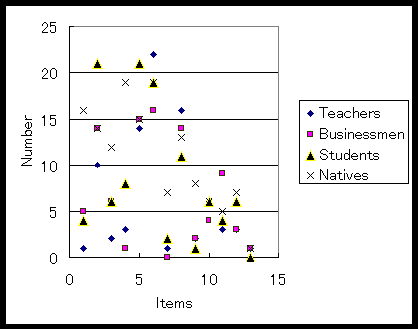
At a first glance you can find each group has no relevance to each other. But the main cause of irrelevancy are the ‘natives answers’.
Chart 3-1-4
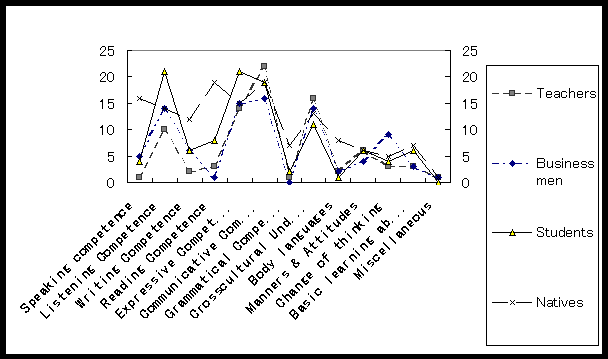
Chart 3-1-4 also shows the correlation of each group, and you can easily recognize that the natives’ awareness of ‘Reading’, ‘Grammar’ and ‘Body language’ is higher than other group. Especially that of ‘Reading’ is the highest.


It’s the very easy analysis; the ‘natives’ group’s answer has a great difference from other groups.
Why is the ‘native’ group so different ?
It’s also easy; some of them checked on all items instead of the restriction( I asked respondents to check three items only into the check-on boxes on the web form sheet.)
And they knew the restriction, they sent me their comments adding the form.
In their comments I could find these important words for English; “Business language”, “Common language”, “International language”, “English for life”, “Total English”…etc.
I have realized that I shouldn’t have been insistent on specifying some English abilities.
Because every English competence has to be needed, and we teachers must aim at “Total English”.
We have to be able to speak, listen to, write, and read English. And the purpose of the acquisition of the four skills is to communicate with people in the world in the common language; English.
Moreover why do we have to communicate with each other?
I think that ultimately we have to be ‘Globalized’.
Then now English is the worldwide common language, but only in Asia we might have to learn other languages; Chinese or Korean as L3 or L4.
We have taught English mainly in terms of lexicon and grammatical achievement. Reflecting on our past conducts we teachers are changing it into communicative one.
Then we have to notice that we should teach English not only by the communicative method but also the grammatical one as in “Total English”.
That awareness of ‘Total balance in English’ is needed for these; ‘Graded method by learners’ age’ and ‘English needs- environment or thoughts’ considering the restricted hours of teaching in Japan.
3-2 The web research on English grammar
I also researched ‘Grammar needs’ on the web, the table 3-2-1 and chart 3-2-1 are the findings.
Research period; From October, 1996 to February, 1997.
Table 3-2-1
| “Do we teachers have to teach the English grammar?" | ||
Yes |
No |
I don’t know |
25 |
2 |
7 |
N=34
X2(2)=25.824, p<.01

Thus more than 70 % of respondents feel the necessity of English grammar teaching. Simultaneously I asked them how to teach English grammar at school.
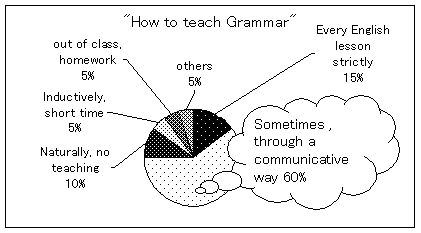
Thus most of respondents think that grammar teaching is necessary. And the way to teach is a ‘communicative way’. It means the ‘inductive method’. Of course most persons related to the English teaching recommend it, but it is hard for the EFL learners to find and master grammar through communication with each other or practical use. The biggest problem is the restricted hours of teaching.
If we have enough time to teach English grammar inductively through the two way communication or practical English, learners will be able to acquire English much more exactly.
Roderick A.Jacobs(1995) said, “ This teacher’s objectives were valid ones – to have his class learn to generalize inductively over a body of language data………..For those students unfamiliar with such constructions, the exploration would provide a useful introduction to these phenomena. For those students already able to understand passages in which these forms occurred, the procedure, if successful, would make them conscious of the grammatical structures they were reading and perhaps more capable of producing new structures modeled on them. The learner is viewed as an active language investigator exploring the new language…A third alternative procedure would have been to present the forms in the context of a piece of English prose and to determine by questioning and discussion whether the class understood the semantic roles of the arguments occurring with each predicate. This could well involve no explicit grammatical presentation, yet the learners might still show that they understand, consciously or unconsciously, the grammatical factors involved. Foreign language learning is thus viewed as being more like first language”.
Roderick A.Jacobs, Oxford University Press, 1995: pp.60-61
Basically when we hear the word grammar we remember the Japanese grammar pattern ("go bunkei"), but the grammar itself is more controversial.
I think that kind of ‘investigator’ will be precious to find the different ways of thinking, the connotation between the lines.
They say we teachers should teach English in terms of ,what is called ,’what to say’.
The linguistic field is useful in that way.
It’s true one of English functions is ‘communication’ and it comes first today, but English itself is one of the languages and it branches into several study fields; English syntax, English culture and life, English history, etc.
English has many aspects. And also the word ‘communication’ has many aspects.
In our restricted hours of teaching we can not teach them all of them. The ultimate purpose to teach English is to have learners acquiring ‘Total English’. But today in our situation it is hard.
I think the graded method would be better through the whole school system (from elementary schools to universities).
And I wonder what the basic English ability is through the whole school system or whole life.
It must be taught by each grade. What is it ?
Next I will give you another finding( See Chart 3-2-3 ).
Chart 3-2-3
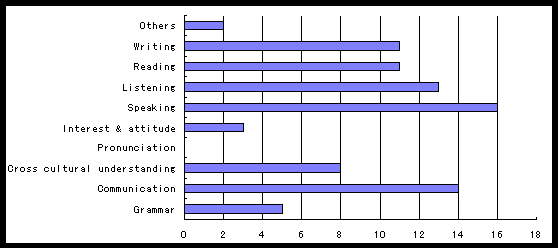
“What is the basic ability for English ?”
Research period; From October, 1996 to March, 1997. N=34
Chart 3-2-3 shows the four skills getting is the basic ability.
They say English beginners should start with listening and speaking teaching.
I agree on that thought.
Now can learners get the skills ?
I’ve said in chapter 2-2, “ it’s the training, not the knowledge”.
Is the training fun ? Is the training interesting ?
Of course , no.
How can we teachers train the learners ?
If we train them compulsorily, most of them will get repressed and upset. Consequently they will come to get nothing. Because the filter prevents learners from getting skills.
When we train the learners we have to take one of two choices.
One is to train them by instructors compulsorily, the other is to let them train by themselves voluntarily.
Of course the latter one is welcomed. Then how can they train ourselves voluntarily ?
I have said in chapter 1-2, it is by “ English needs”.
I am sure that when they really need English or feel English needs they will come to study and even train themselves voluntarily.
Especially we have the restricted hours of teaching, so the ‘total English’ development of learners owes a great deal to their homework or extra works.
Do we have to administer after school students’ works ? Of course , we mustn’t administer after school students’ lives. When we teach ‘total English’ through the motivation out of English needs they will come to get the skills voluntarily.
In other words it might be called ‘consciousness of EOP’.
3-3 Summary
“The importance of whole language acquisition cannot be emphasized, but the need must be made real and practical to them. For example, in the future when they’re working for a company, what will happen if they lose a big business deal because of not knowing how to communicate effectively in English which is now the business language of the world! “ (by a college student in the U.S.)
“I think it is important for junior high school students in Japan to learn English just as I think it is important for junior high school students in the US to learn a foreign language. If US students can learn another language before junior high, that's even better. In the long run, it will help them find work and be more marketable in the working world. I understand the difficulties that J.T.E.'s face in trying to teach English
to these students because there is no reason to use English outside of class. The same problem exists in the US. Students can learn all the languages they want, but unless they have someone to practice with, it is very likely that they will forget what they have been taught. Students need to be submersed into the language that they are studying in order to really learn it.” ( by a businessman in the U.S.)
“Yes. I think they need because almost everything it's accessible in English. As the world became smaller by globalization.
Everyone who wants a better job needs to communicate If you can communicate to several nationalities, you can make the difference.” ( by a college student in Brazil)
“I can only concur with the Japanese Ministry of Education in their decision to have native speakers as instructors. A solid computer program, CD system has good instructional potential. Languages however are alive they express emotions, tempo, rhythm, subtle changes in meaning that a computer has not as yet been able to duplicate. A native speaker, or a teacher who has lived for at least 3 months in an English Speaking country brings to the class first hand stories which captures a students imagination. I often captured my students interest when I recounted my 3 minutes in Marsailles, France. Three locals thought that I was American (U. S. A type) until I spoke to them in French. They were shocked and became quite friendly. Moments before, with no language, they were ready to push me down an alley and take my wallet and my life !
Recounting that moment and others in French, and German kept my classes interesting in their studies of business and world cultures.
My wife, who has been an ESL teacher in Germany specialized in written and verbal instruction. I specialize in creative thinking, story telling and Speaking Skills. We are now into our second year of having our own ESL private school. Geraldine teaches 3 hours of grammar and vocabulary, then I take over with 3 - 5 hours of conversational skills. We have our students immersed in English for 12 - 18 hours per day: helping to cook breakfast, lessons, gardening, boating instructions, hiking and tours to places of interest. Evenings we expect diaries to be written and read allowed to all others the next day.
A low technology idea for your research is the use of a tape-recorder to capture the teachers voice, and playing back the students voice. We also encourage the listening to English radio (not television) to stimulate conversation. Have your students read English magazine articles and to summarize the article - verbally in class on the tape. Some teachers create a mock Radio Station teaching environment. At times students read announcements over the school public address system.”
( by an ESL instructor in Canada )
Those comments are several ones among over 200 comments.
Many of them referred to the ‘English needs’ or practical English use.
In the real world the English language is alive, but here in Japan it is the pedagogical world. It is almost a dead language like Latin. Teachers and learners can hardly feel English needs. It almost functions just as EAP.
Therefore GTM ( grammar translation method ) has no hindrances.
In my opinion listening training is very important , but it will sometimes become boring. As to my experience once I used to persist on the recitation and listening, but the lesson became monotonous and boring for students before long. Because ‘English for fun’ has been prevailed, however, the training is a hard thing. It’s true ‘English for fun’ is important in terms of the comprehensive input using games as relaxation, refreshment, recreation, but in terms of the skill getting sometimes they will get nothing.
Then I think of how to have students feeling ‘English needs’. And I expect the needs to lead to the students’ voluntary learning or training.
In short I aim at the enhancement of the motivation out of English needs. And in the concrete lesson procedure I recommend the recitation and listening training.
That ‘the motivation out of English needs’ is the main theme of this thesis.
I’ve said before ( chapter 1-2 ), “English needs result from the poverty, conflict and diversity.” ‘Poverty, conflict and diversity’ is one of the ‘Global Issues’.
I expect to enhance the students’ motivation when I introduce the ‘Global Education’ as the topic to the lesson.
As to my idea of the lesson reform, these three key points must be introduced and added to the lesson; ‘Listening training’, ‘problem-solving task’, ‘Global Education’. I mean those items should be added to the current ‘communication’ and ‘grammar’ teaching.
Of course we cannot do that every lesson. All through the year they will be introduced respectively.
Anyway I regard Global Education as tool of the motivation for English. Global Education itself has many, deep and vast issues. So we cannot teach it in details, and we may not introduce it into only English, either.
Next Chapter I will tell you the globalization at school so far.
98/05/05